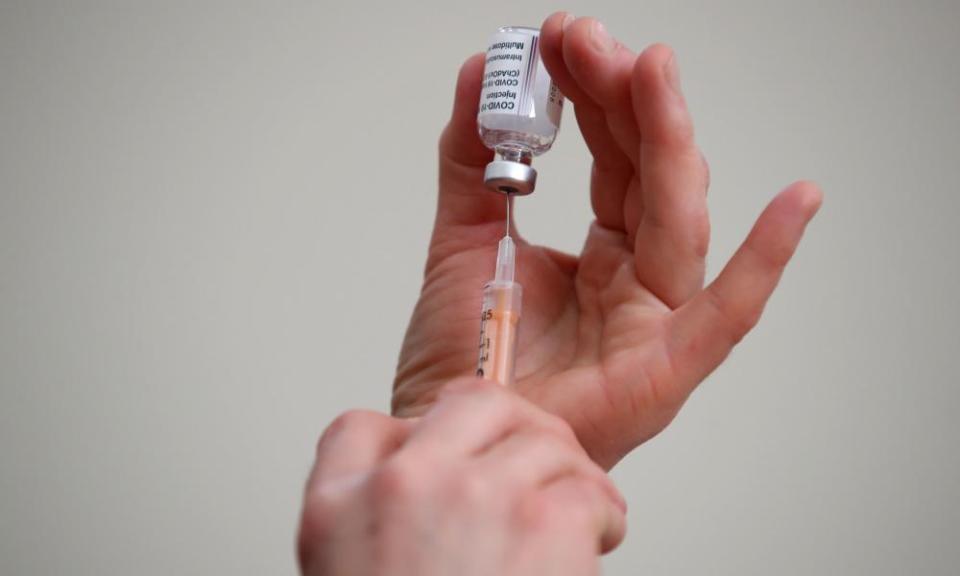Vaccine experts call for clarity on UK's 12-week Covid jab interval

Experts have called for greater clarity on the monitoring in place to assess the 12-week dosing interval for Covid-19 vaccines, as the row over delayed second doses continues.
The UK’s coronavirus vaccination programme was shifted late last year to prioritise administering the first dose to as many at-risk people as possible. As a result, the interval between the two doses was increased to up to 12 weeks.
But the move has proved controversial: while there is evidence from trials that a 12-week gap does not reduce the efficacy of the Oxford/AstraZeneca vaccine, Pfizer has stressed it has no data on whether protection after the first dose is sustained after three weeks.
The chief executive of the British Society for Immunology said there needed to be greater clarity about how the potential effect of a 12-week dosing gap was being assessed, particularly in terms of the body’s immune response.
“If we are changing the dosing schedule [compared with] what was done on the trials then we need to have a robust programme monitoring the immune response,” said Dr Doug Brown.
Related: Doctors call for shorter gap between Pfizer Covid vaccine doses in UK
The society has previously said that while it would have preferred the dosing schedule in the clinical trials to be followed, the shift to a 12-week gap was understandable given the current crisis. But it has called for studies to assess how altering the dosing interval affects the efficacy of the vaccines, and for rapid modification of dosing schedules as appropriate.
Public Health England’s Covid-19 vaccine surveillance strategy states that a number of monitoring processes are in place, including linking pillar 1 and pillar 2 testing data to vaccination data, taking repeated swab and serum samples from a subset of cases among those who were eligible early on for the vaccine, and looking at whether Covid patients treated in hospital have received the jab.
There are also plans to extend studies such as the infection survey by the Office for National Statistics and the Siren study, which looks at infections among healthcare workers, to monitor vaccine effectiveness against infection. At present experts say that while the vaccines protect against disease, it is not clear whether and to what extent they may prevent people becoming infected with coronavirus and passing it on to others.
But Brown said further details of immunological studies still needed to be revealed, adding the society had recently written to the government, repeating its request for more information.
He said: “As things move quickly we do really want to see those details as soon as possible so that we can support them in developing the best monitoring programme possible.”
Brown said there was currently a unique window of opportunity to explore how best to use the vaccines now and in the future. “We are assured studies are ongoing but whether they are the types of studies as a body of immunologists we’d like to see there is still a question mark,” he added.
Others have gone further, calling for large randomised control trials exploring different dosing regimes.
Prof Sheila Bird, formerly of the Medical Research Council’s biostatistics unit at the University of Cambridge, said the approach would mean comparisons could be made on a like-for-like basis and would help to answer questions ranging from the short-term impact on Covid cases in the weeks after the first dose of the Pfizer/BioNTech vaccine was given, to the longer term effect of different dosing schedules on Covid-related hospital cases, and even the potential impact on long Covid.
Brown said one problem with such trials was that they would require one group of participants receiving two doses of the jab three weeks apart, meaning fewer doses would be available for others to receive their first jab. But Bird said robust trials could be carried out with only a quarter of those involved receiving two doses with the shorter interval.
The calls for greater clarity around monitoring studies come as the British Medical Association called for the gap between Pfizer/BioNTech doses to be reduced to six weeks, citing concerns the vaccine could be less effective with a 12-week interval.
Others, however, have defended the 12-week gap, saying it was the best way forward once the risks and benefits had been weighed up.
Prof Anthony Harnden, the deputy chair of the Joint Committee on Vaccination and Immunisation, agreed, telling Sky News’s Sophy Ridge on Sunday the evidence was still in favour of delaying the dose, with the JCVI believing it would “save many lives nationally”.

 Yahoo Finance
Yahoo Finance 